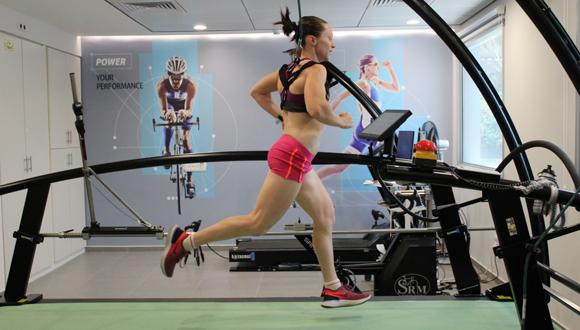Our Services - Running
Want to know how fast you can go? Or how far? Want to reach your full potential?
Our evaluation of your running abilities includes a running endurance test on one of the most advanced treadmills in Israel. Our running lab include 2 running treadmills: (1) H/P Cosmos Saturn 300 and (2) 3D treadmill for biomechanics.
The Saturn 300 can run up to 80 kph (including backwards) and generate incline of up to 40% (including downhill). The treadmill can accommodate high speed runners and because of it’s wide and long belt, it can serve Paralympic cyclists, road runners, etc.
The 3D treadmill has a built-in force plate and pressure sensors that provide detailed running biomechanics and kinematics. It provides full analysis of your running pressures running symmetry, ground reaction forces, and much more, such as:
- Vertical ground reaction and horizontal braking forces
- Areas of increased pressure under the foot
- Landing patterns: heel strike, mid-foot or fore-foot strike
- Stride length, step length, cadence, step time
- Symmetry of pressure, force and gait patterns
To assess further biomechanics whilst running on the treadmill, we have high speed cameras that enable us to assess the upper and lower extremity body positioning throughout the running trial.
During a running test we can simultaneously measure your muscle function (using EMG electrodes attached to your lower limbs) and VO2 including (but not necessarily), lactate measurements. These will provide an example of a one-stop-shop that allows detailed evaluation of the runner’s capabilities.
The EMG (electromyography) electrodes, placed on specific muscles during the running assessment provide information on how the muscles are functioning. The feedback from the electrodes indicate when the muscles are active, whether they are overactive, inactive or if certain muscles are compensating for other muscles. The EMG muscle activity analysis is also able to provide feedback on symmetry and indications of possible muscle fatigue.
The test includes an incremental training session, of the treadmill. During the test you will be asked to increase your running speed every minute (or every 3 minute) until you reach your maximum effort.
A movement assessment can also be performed on the athlete to assess flexibility, strength and movement function of various muscles. The identification of muscles that are potentially weak, tight, dysfunctional during movement tests or asymmetrical provides information for corrective feedback to improve running performance and prevention of injury.
The lab provides body composition analysis which include skin fold and bio-impedance measurements, resting metabolic rate (RMR) measurement, and lung function test (spirometry). The data can provide meaningful information regarding swimming/running/cycling metabolic efficiency under resting and exercise conditions.
We recommend several protocols each for different purpose, for example, a ramp test, to measure VO2max during incremental exercise test. We can also suggest a steady-state protocol by which we measure blood lactate during each stage until reaching maximal effort.
The data collected from your training sessions and while asleep can provide additional information regarding your recovery time and sleeping quality. These is the only lab in the country, to the best of our knowledge that provide such an extensive insights into your performance.


